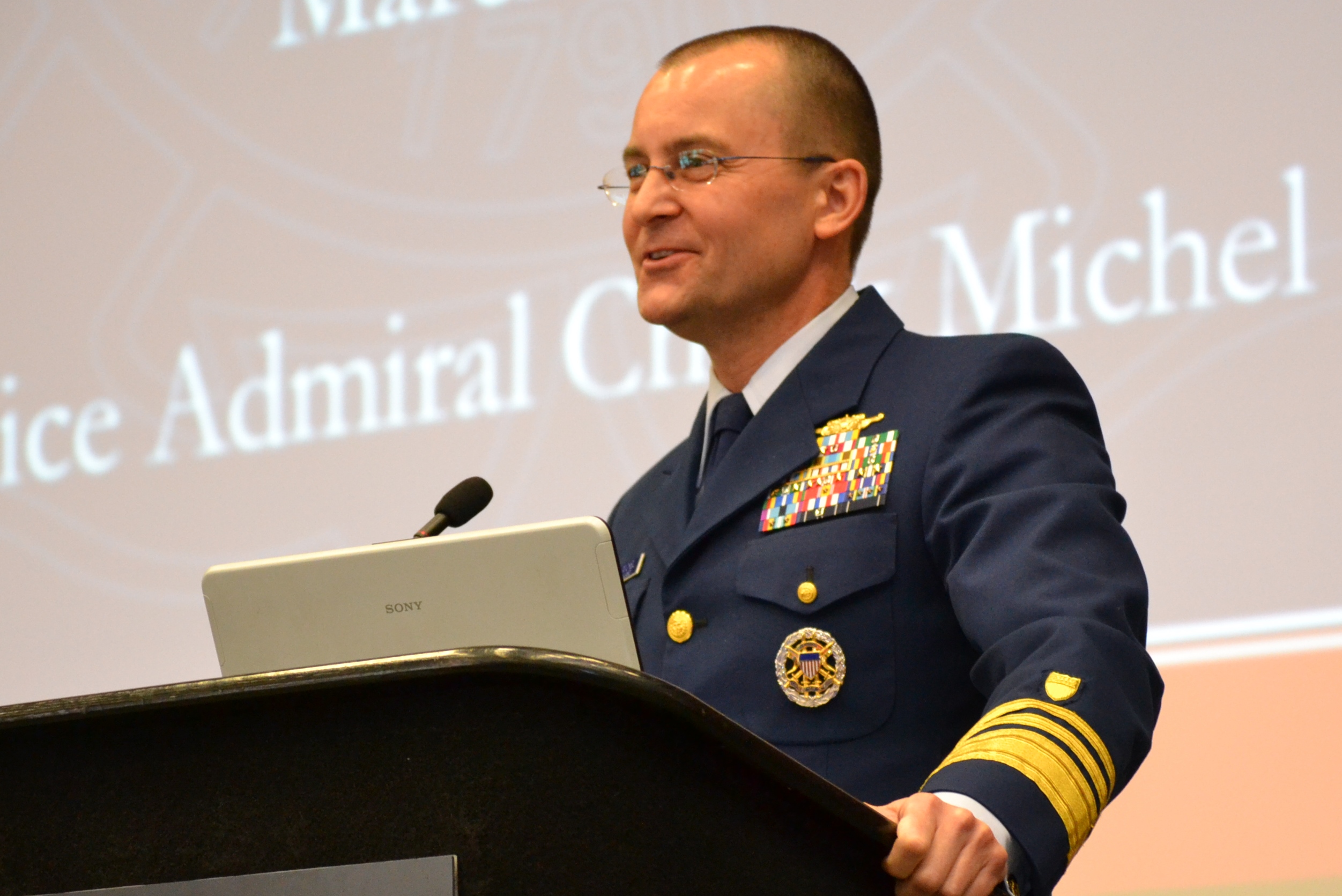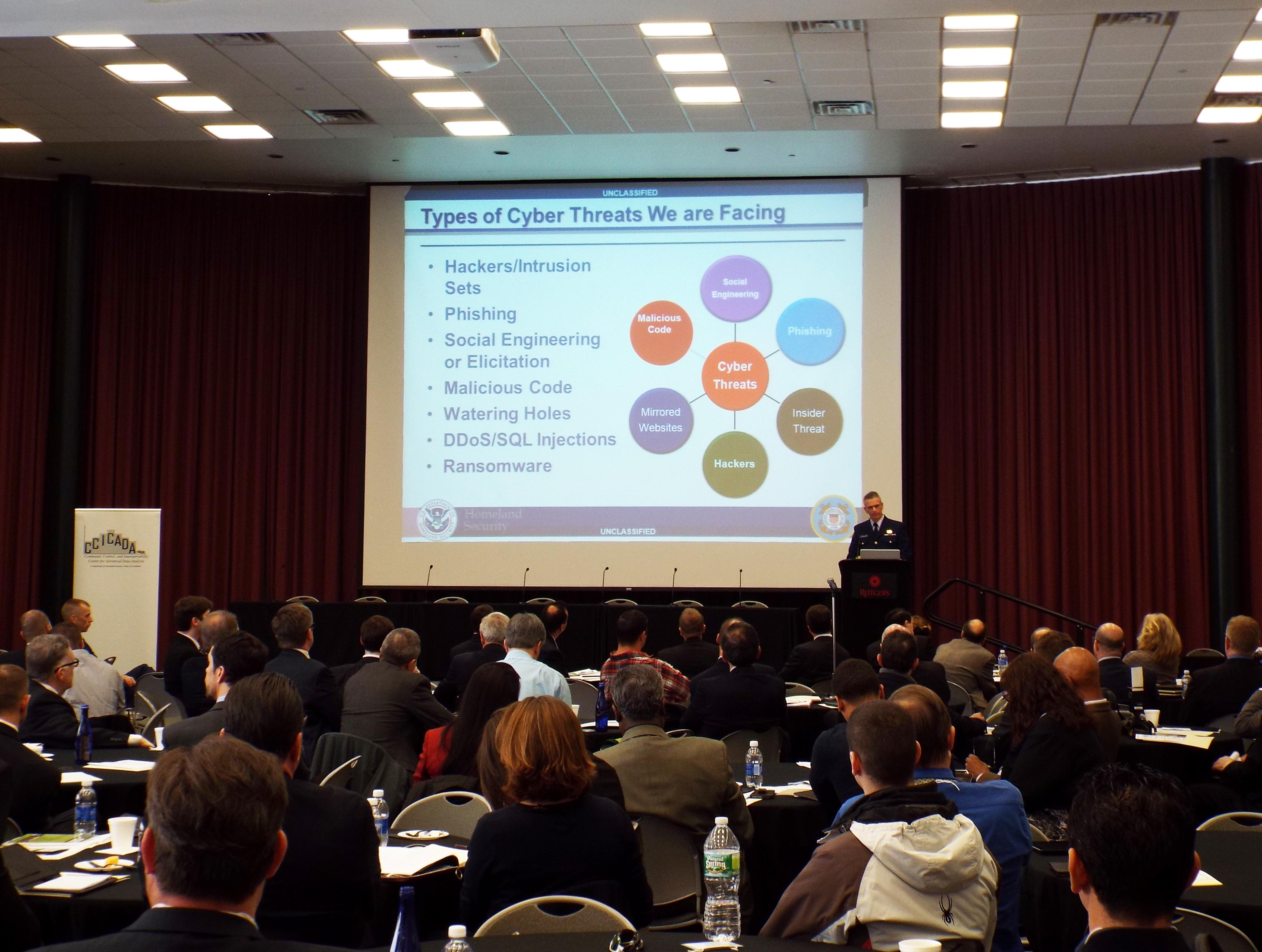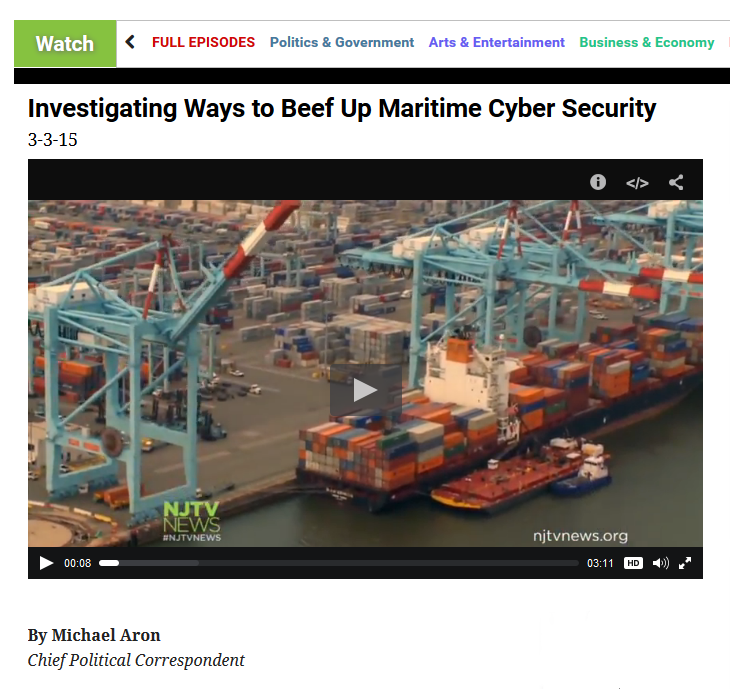

Maritime Cyber Security Symposium hosted by CCICADA at
Rutgers University
[March, 2015] On March 2-3, 2015 CCICADA,
the homeland security center of excellence based at DIMACS, hosted a
Maritime
Cybersecurity Learning Seminar and Symposium at Rutgers
University.  The
organizers believe it to be the first event dedicated to
articulating the cybersecurity challenges and threats to the
maritime transportation system. The symposium was jointly organized
and sponsored by CCICADA and the American Military
University, with additional sponsorship from the Centre for Combined Joint
Operations from the Sea, a NATO center based in Norfolk. It
brought roughly 150 participants to Rutgers and reached over 200
more who participated remotely. Vice Admiral Chuck Michel, the
Deputy Commandant of the Coast Guard, highlighted the importance of
the event by unveiling the Coast Guard’s new cyber security strategy
in its first public preview, and he invited attendees to help ensure
that they “get it right.” Vice Admiral Michel’s talk is covered in
more detail in a related CCICADA
article.
The
organizers believe it to be the first event dedicated to
articulating the cybersecurity challenges and threats to the
maritime transportation system. The symposium was jointly organized
and sponsored by CCICADA and the American Military
University, with additional sponsorship from the Centre for Combined Joint
Operations from the Sea, a NATO center based in Norfolk. It
brought roughly 150 participants to Rutgers and reached over 200
more who participated remotely. Vice Admiral Chuck Michel, the
Deputy Commandant of the Coast Guard, highlighted the importance of
the event by unveiling the Coast Guard’s new cyber security strategy
in its first public preview, and he invited attendees to help ensure
that they “get it right.” Vice Admiral Michel’s talk is covered in
more detail in a related CCICADA
article.
U.S. ports handle more than $1.3 trillion in cargo every year and
are vital to the nation’s economy, and like other critical
infrastructures, maritime transportation must be protected against
both physical and cyber threats. Increasingly, port and vessel
operations are controlled by networks, which symposium speakers
identified as attractive targets for exploitation and potentially
crippling sources of vulnerability. Coast Guard Rear Admir al
Marshall Lytle opened the event by describing modern ports and
vessels as entirely networked and largely automated. Networks are at
the heart of navigation, radar, and engine systems on vessels—he
said that “virtually nothing” happens on a modern container ship
without networks. Likewise for port operations—cranes move via GPS
allowing unloading of a cargo ship to be almost completely
autonomous.
al
Marshall Lytle opened the event by describing modern ports and
vessels as entirely networked and largely automated. Networks are at
the heart of navigation, radar, and engine systems on vessels—he
said that “virtually nothing” happens on a modern container ship
without networks. Likewise for port operations—cranes move via GPS
allowing unloading of a cargo ship to be almost completely
autonomous.
While the cyber exploits in the maritime domain sound
familiar—denial-of-service attacks, phishing, Trojan horses,
viruses, and worms—the potential scenarios sound both larger than
life and entirely plausible. Reliance on GPS for navigation both at
sea and in ports poses a more domain-specific threat. Rear Admiral
Lytle offered an example of a trucker who used a GPS jamming device
to prevent his employer from tracking him, but in so doing, he
unwittingly interrupted cargo operations every time he made a pickup
at the port. Another example concerned the Electronic Chart Display
and Information System (ECDIS), a computer-based navigation system
that augments and largely supplants paper navigation charts. ECDIS
integrates a variety of real-time information and serves as an
automated decision aid, continuously determining a ship’s position
in relation to land, charted objects, navigation aids, and unseen
hazards. It includes electronic navigational charts and integrates
position information from GPS and other navigational sensors. Rear
Admiral Lytle noted that ECDIS is not a “closed environment,” and
malicious corruption of chart data or other navigational information
could lead to the grounding or diverting of enormous vessels.
Other speakers at the event represented a wide range of expertise in
the maritime and cybersecurity domains. Among them were: Dr. Phyllis
Schneck, Deputy Under-Secretary for Cybersecurity and Communications
at the Department of Homeland Security (DHS), who described the National
Cybersecurity and Communications Integration Center and building capabilities for automated machine-to-machine
communication to block cyber threats in real time; Christopher
Rodriguez, Director of New Jersey’s Office of Homeland Security and
Preparedness, who was featured with Vice Admiral Michel in a related
report
by Michael Aron of NJTV News; and Stephen Caldwell, Former
Director of Maritime and Supply Chain Security at the U.S.
Government Accountability Office, who compared the findings of
reports on maritime cybersecurity from agencies in Europe,
Australia, and the U.S., including a 2014 GAO report
that he led. Among the common themes in the reports and in the
Symposium presentations was the low level of cybersecurity awareness
in the maritime domain and the critical need to increase it.
and building capabilities for automated machine-to-machine
communication to block cyber threats in real time; Christopher
Rodriguez, Director of New Jersey’s Office of Homeland Security and
Preparedness, who was featured with Vice Admiral Michel in a related
report
by Michael Aron of NJTV News; and Stephen Caldwell, Former
Director of Maritime and Supply Chain Security at the U.S.
Government Accountability Office, who compared the findings of
reports on maritime cybersecurity from agencies in Europe,
Australia, and the U.S., including a 2014 GAO report
that he led. Among the common themes in the reports and in the
Symposium presentations was the low level of cybersecurity awareness
in the maritime domain and the critical need to increase it.
A major goal of this first symposium on the topic was to raise
awareness by bringing maritime cybersecurity to the attention of a
wider audience. In his opening remarks, CCICADA Director Fred
Roberts noted that outcomes from the event will include a
post-symposium book and recording of presentations that he hopes can
be used for educational purposes in future courses.
To learn more about the Symposium, the CCICADA website includes more
detailed articles on the Symposium
in general and on the discussion related to cybersecurity
education.
Printable version of this story: [PDF]
 DIMACS Homepage
DIMACS Homepage
Contacting the
Center
 al
Marshall Lytle opened the event by describing modern ports and
vessels as entirely networked and largely automated. Networks are at
the heart of navigation, radar, and engine systems on vessels—he
said that “virtually nothing” happens on a modern container ship
without networks. Likewise for port operations—cranes move via GPS
allowing unloading of a cargo ship to be almost completely
autonomous.
al
Marshall Lytle opened the event by describing modern ports and
vessels as entirely networked and largely automated. Networks are at
the heart of navigation, radar, and engine systems on vessels—he
said that “virtually nothing” happens on a modern container ship
without networks. Likewise for port operations—cranes move via GPS
allowing unloading of a cargo ship to be almost completely
autonomous. 

 and building capabilities for automated machine-to-machine
communication to block cyber threats in real time; Christopher
Rodriguez, Director of New Jersey’s Office of Homeland Security and
Preparedness, who was featured with Vice Admiral Michel in a related
and building capabilities for automated machine-to-machine
communication to block cyber threats in real time; Christopher
Rodriguez, Director of New Jersey’s Office of Homeland Security and
Preparedness, who was featured with Vice Admiral Michel in a related